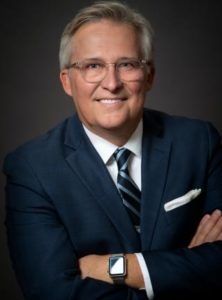Carolyn Weatherford Crumpler was a Baptist icon of her generation. For 15 years, she served as executive director of Woman’s Missionary Union, an auxiliary organization to the male-dominated Southern Baptist Convention.
When she retired in 1989, she was tired of perpetuating the structure of male leadership and female submission. She helped form the Cooperative Baptist Fellowship. I remember Carolyn telling us stories of her beloved Sunday school class at her church in Cincinnati.

George Mason
She belonged to the BYKOTA class. BYKOTA is an acronym made up of the first letters of the words of Ephesians 4:32 from the King James Version: Be ye kind one to another — BYKOTA. But it wouldn’t be just an acronym to them; it would become an autonym, a self-fulfilling description. Their commitment was not just to go by the name BYKOTA but to be BYKOTA people.
Every church should be BYKOTA people. I don’t think it’s a coincidence that the word used here for “kind” in Greek is chrestos, and the word for “Christ” is Christos. Paul wanted us to understand that to be like Christ is to be kind.
What Paul means here, in part, is to quit trying to deceive people for our own advantage, and instead be transparent for everyone’s sake. That is, stop politicizing everything and start thinking of the common good. Ever wonder if the Bible is relevant today?
A second thing he means is to go ahead and be angry at injustice, but don’t let it consume you to the point that it eats you alive and allows the Evil One to win by sowing suspicion and reaping hostility in all your relationships. Try to find the humanity in people you can’t stand, so that they don’t take up residence inside you and change who you are.
He also wants us to take our cues from Christ’s example, not from the prevailing culture that is always looking out for its own rights and forgetting about its responsibilities to our neighbors.
“Stop politicizing everything and start thinking of the common good.”
All this is relevant to our present situation with COVID and vaccines.
Last week while on a trip to California, I met a fellow passenger on an elevator who turned out to be Lori Carter-Edwards, an epidemiologist and public health expert who has been teaching at the University of North Carolina and Duke University. She has spent the last two years consumed with the COVID-19 pandemic. She even started a faith network in North Carolina to address the need for vaccinations, contact tracing and masking through these traditionally trusted cultural contexts.
We talked about our disappointment with the way people have been treating this virus. So much of it boils down to a focus on rights versus responsibility, self versus neighbor, individual versus the community.
She gave an example: If you are skiing at a resort and you come upon a part of the mountain marked as dangerous and off limits, but you decide you know better than anyone else and accept the risk yourself of what will happen to you, fine. You go defy expert wisdom and exercise your personal freedom. You have a predicable accident. The community doesn’t just leave you there to suffer the consequences of your poor decision. We send a rescue team to find you, have you care-flighted to a hospital, give you medical treatment in a bed someone else should have had, and all our health insurance costs go up at your expense, not to mention the diversion of resources that should have been employed elsewhere.
This is the situation we find ourselves in today with COVID in this country. And we are all paying for it. I can’t tell you how frustrated I am by it.
In the spirit of trying to live like Paul instructs in Ephesians, this past Sunday I had to tell our congregation why we are going backward in our COVID protocols and giving people more reasons not to come to church. Four people who were at church or church activities in the last week have tested positive for the virus. We believe it is contained, and none of them have been hospitalized.
“Saved people save people.”
I confess that I spend almost every day trying to figure out what valid justification half of Americans have for still being unvaccinated. I know in my own extended family there are a few who are unvaccinated due to certain health issues that I can understand, although not in every case. But for the most part, we have a continuing crisis of people who think they are bulletproof, aren’t vulnerable, or would rather die than be told by the government that they should do something.
How about this: It’s not all about you! It’s about protecting your neighbor. Saved people save people. Don’t talk to me about evangelism if you won’t even walk across the street to take a vaccine to save somebody’s life.
Paul says we are members of one another. And he’s not just talking about church members. He means neighbors in the wider society. That includes people we otherwise don’t agree with.
As Martin Luther King once said: “We are caught in an inescapable network of mutuality, tied in a single garment of destiny. Whatever affects one directly, affects all indirectly.” Or, as G.K. Chesterton put it: “We are all in the same boat in a stormy sea, and we owe each other a terrible loyalty.”
I am tired of people using their freedom to hurt other people. I am angry about politicians who would rather appeal to their base out of personal ambition and call it principle than to use their powers to protect those in their charge.
“I am tired of people using their freedom to hurt other people.”
I am also weary of worrying about the church. We’ve worked 70 years to build something here at Wilshire that matters to people, 32 of those years on my watch. And I’m not going down — or letting this church go down — without a fight.
So, that’s what I’m working on. I want to be a BYKOTA Christian, I really do. I want to be kind. But I know I need the prayers of the church. I want us to be a BYKOTA church — a kind church. It matters for all of us, of course, because kindness is about us, not about me.
It turns out, being kind is no small matter.
George Mason serves as senior pastor of Wilshire Baptist Church in Dallas and is host of the “Good God” podcast.
Related articles:
Francis Collins: ‘Give God the glory’ for vaccines ‘but roll up your sleeve’
6 things you should know about the COVID vaccine | Opinion by Christy Edwards and Jen Dilts
While Americans reject COVID vaccines, other parts of the world beg for access


